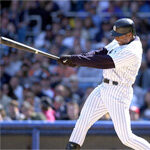David Ortiz: Performing in the Zone
Being “In The Zone” For Game Time David Ortiz is one of two baseball players in MLB history to get on base 15 times (11 hits and 4 walks) in the first five games in a World Series. Is Ortiz performing in the zone at the right time? Think for … Read Sport Psychology Tip






